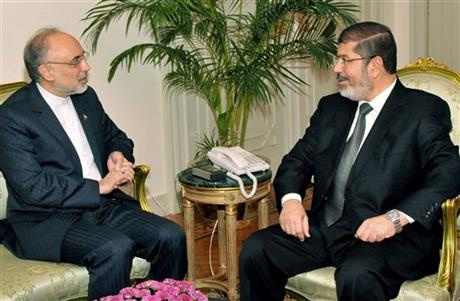Regional Solution for the Syrian Crisis

The recent visit of Dr. Ali Akbar Salehi, Iran's Foreign Minister, to Egypt and his meeting with Mohammad Morsi, the president of this country, is an attempt by Iran to reduce regional differences for a peaceful solution to the crisis in Syria within the framework of a political solution.
Iran believes in bringing regional perspectives closer together in order to solve regional issues, including the Syrian crisis. But reducing the differences between the four major players of the region, i.e. Iran, Egypt, Saudi Arabia, and Turkey, with regard to the issue of Syria is not easy, for each one of these players has its own solution with different methods and goals.
Perhaps, among these four players, the viewpoints of Iran and Egypt, in comparison with the other two players, Saudi Arabia and Turkey, are more flexible. The reason is that both Saudi Arabia and Turkey consider their interests in line with the policies of the extra-regional player, which is the US; hence, they are determined to continue their present policy of regime change in Syria.
In contrast, the viewpoints of Iran and Egypt rely more on the strengthening of regional viewpoints and on commonalities including the necessity of halting violence, the non-intervention of foreigners, and concentration on a political solution and dialogue. Of course, the major difference between Iran and Egypt is the issue of Bashar Assad's remaining in power or not; a point which was once again reiterated by the spokesman of Morsi's government in the recent meeting in Cairo.
On the other hand, although developments in the Arab World prioritize concentration on political, social and ideological reformist demands, that is to say domestic issues of Arab countries, a major competition still exists among governments as classic players of the Middle East’s political scene within the framework of maintaining their roles and equations of power.
Under the new circumstances, the grounds for competition and cooperation of regional players are more concentrated on the creation of balance between the active state of domestic policies of countries, on one hand, and playing regional roles, on the other. On this basis, Turkey and Saudi Arabia, influenced by their domestic issues and their regional roles, have taken the inflexible position of regime change of Syria.
With regard to Turkey, the Erdogan government, although influenced by the pressures of domestic policies, is reaching a more realistic position in dealing with the crisis in Syria on the basis of which it participated in the recent Quartet meeting in Cairo. However, it still emphasizes its declared positions on Assad's resignation in order to strengthen its economic interests and play the role of a regional political leader.
As for Saudi Arabia, non-participation of this country in the Cairo meeting is probably due to the existing differences between the elites of the Saudi regime in dealing with the crisis in Syria, on one hand, and the unwillingness of the Saudis to solve this crisis politically and in a regional context, on the other, an issue which might lead to the strengthening of Iran and Egypt’s roles.
Under these conditions, reducing the differences between the viewpoints of Iran and Egypt can be the key to solving the Syrian crisis, and at the same time, it can impact the viewpoints of Turkey and Saudi Arabia in accepting a political solution in a regional context.

